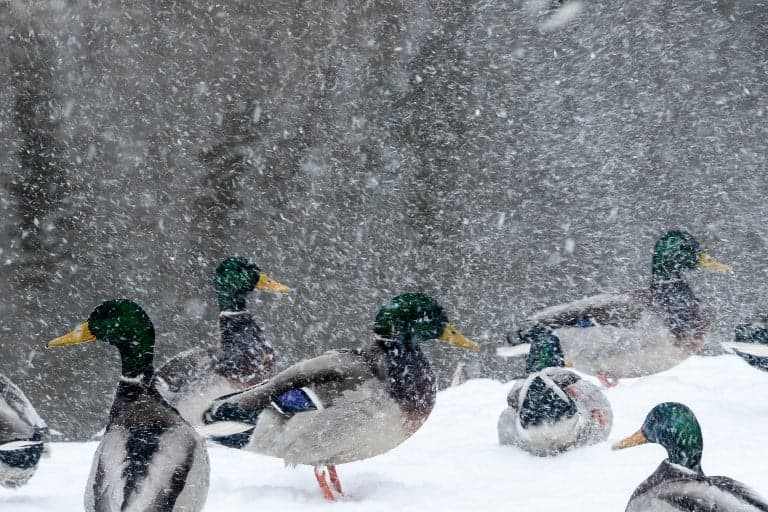'It's duck cold!': How the French complain about winter weather

During the chilly winter season, you may well have heard the phrase 'Il fait un froid de canard' - here are some of our favourite animal-related French phrases that will come in handy during winter.
French boasts plenty of weather-related expressions that make reference to animals.
Here’s a look at some of them.
(Il fait un) froid de canard!
This expression translates to 'It's duck cold' with 'duck' serving as an intensifier.
The extreme cold is suitable for duck hunting, since ponds and lakes freeze over, making the ducks’ normal homes in the reeds and shallows uninhabitable, and leaving them vulnerable to predators (like humans).
READ ALSO: 'It curdles!' and other French expressions to talk about the cold
(Il fait un) froid de loup
An alternative to froid de canard, froid de loup (wolf-cold) is believed to have its origins in Bourgogne-Franche-Comté, near the Swiss Alps.
When the cold north wind blew, the roof tiles made a crackling sound.
Locals believed that this presaged the imminent emergence of hungry wolves from their lairs, obliging them to bring domestic animals (and themselves) inside where it was safe and warm.
(Il fait un) temps de chien
This literally means ‘(it’s) dog weather’ but is actually used to mean the opposite.
The expression is most likely a shortened version of il fait un temps à ne pas mettre un chien dehors, ‘It’s weather to not put the dog out’. Not all that far off from a ‘three dog night’, the Australian expression for a night where one needs to sleep with three dogs in order to keep warm.
(Il fait un) vent à décorner les boeufs
This expression means ‘(There’s) wind that dehorns the oxen'.
This phrase is often understood as a simple exaggeration. In reality, its roots are probably more complicated.
The dominant theory is that when 19th century farmers would dehorn oxen (necessary to keep them from hurting each other), they would choose a day that was particularly windy. In the absence of disinfectant, the wind would keep insects away from the open wounds of the animals. There’s a mental image for you.
Pleuvoir comme vache qui pisse
'Raining like a pissing cow’ is not one of the French language’s more elegant expressions.
Anyone who has had the opportunity to observe a cow urinating will have no trouble understanding it, though French also uses the word vache as an intensifier in general. It is of course equivalent to ‘raining cats and dogs’, but more fun to say.
Comments
See Also
French boasts plenty of weather-related expressions that make reference to animals.
Here’s a look at some of them.
(Il fait un) froid de canard!
This expression translates to 'It's duck cold' with 'duck' serving as an intensifier.
The extreme cold is suitable for duck hunting, since ponds and lakes freeze over, making the ducks’ normal homes in the reeds and shallows uninhabitable, and leaving them vulnerable to predators (like humans).
READ ALSO: 'It curdles!' and other French expressions to talk about the cold
(Il fait un) froid de loup
An alternative to froid de canard, froid de loup (wolf-cold) is believed to have its origins in Bourgogne-Franche-Comté, near the Swiss Alps.
When the cold north wind blew, the roof tiles made a crackling sound.
Locals believed that this presaged the imminent emergence of hungry wolves from their lairs, obliging them to bring domestic animals (and themselves) inside where it was safe and warm.
(Il fait un) temps de chien
This literally means ‘(it’s) dog weather’ but is actually used to mean the opposite.
The expression is most likely a shortened version of il fait un temps à ne pas mettre un chien dehors, ‘It’s weather to not put the dog out’. Not all that far off from a ‘three dog night’, the Australian expression for a night where one needs to sleep with three dogs in order to keep warm.
(Il fait un) vent à décorner les boeufs
This expression means ‘(There’s) wind that dehorns the oxen'.
This phrase is often understood as a simple exaggeration. In reality, its roots are probably more complicated.
The dominant theory is that when 19th century farmers would dehorn oxen (necessary to keep them from hurting each other), they would choose a day that was particularly windy. In the absence of disinfectant, the wind would keep insects away from the open wounds of the animals. There’s a mental image for you.
Pleuvoir comme vache qui pisse
'Raining like a pissing cow’ is not one of the French language’s more elegant expressions.
Anyone who has had the opportunity to observe a cow urinating will have no trouble understanding it, though French also uses the word vache as an intensifier in general. It is of course equivalent to ‘raining cats and dogs’, but more fun to say.
Join the conversation in our comments section below. Share your own views and experience and if you have a question or suggestion for our journalists then email us at [email protected].
Please keep comments civil, constructive and on topic – and make sure to read our terms of use before getting involved.
Please log in here to leave a comment.